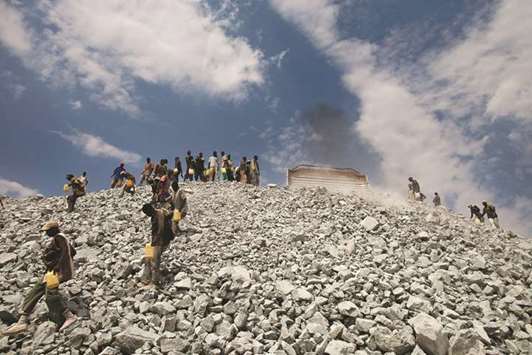One by one, the biggest names in African mining are getting squeezed. The tactics might be blunt, but the message is clear: the countries where they operate want a bigger share of the proceeds.
The collapse in commodities through 2015 hobbled some of Africa’s biggest resource economies, stunting growth and leaving budgets short. Since then a recovery in prices has sent the continent’s biggest miners soaring, boosted profits and rewarded shareholders with bumper payouts. But a lack of returns to governments is drawing a backlash from Mali in the Sahara to Tanzania on the Indian Ocean.
Zambia is the latest flash point. Africa’s second-biggest copper producer slapped a $7.9bn tax assessment on First Quantum Minerals Ltd and said it’s planning an audit of other miners in the country. Companies operating in Zambia include units of Glencore and Vedanta Resources.
Next door in the Democratic Republic of Congo, Glencore, the world’s biggest commodity trader, is dealing with a dispute over a new mining code that dramatically boosts taxes, while major gold producer Mali has reportedly said it might follow Congo’s example. Tanzania has all but crippled its biggest gold miner Acacia Mining, a unit of Barrick Gold Corp, with export bans and a whopping $190bn tax bill.
Barrick also has a copper mine in Zambia, though it says it hasn’t received any notifications from Zambian authorities about a potential audit or tax reassessment, according to spokesman Andy Lloyd.
Countries “want a larger share of the rent,” Hunter Hillcoat, an analyst at Investec Securities Ltd in London, said by phone. “The mining companies are doing extremely well and governments are taking the opportunity to seize a slice of that.”
Part of the governments’ motivation is pecuniary. Zambia’s economy, for example, grew in 2016 at the weakest pace since the start of the millennium and the government is struggling with a budget deficit. Zambia’s President Edgar Lungu has urged First Quantum and the tax authority to reach a swift resolution. In Congo, economic growth has also slowed and the country’s foreign exchange reserves have plunged.
There’s a wider dissatisfaction than just money. Many governments feel the companies that operate on their territory haven’t delivered on their promises, either through operational setbacks or the use of legal tax planning to transfer profits offshore.
In Tanzania, President John Magufuli accused Acacia of under-declaring export revenue and hit it with a record $190bn tax bill. In Congo, the state-owned copper miner has accused its joint-venture partners, including Glencore’s Katanga Mining Ltd, of using inter-company loans to reduce the profits that are declared in the country and promised to investigate.
The aggressive rhetoric has been contagious, according to Charles Robertson, London-based global chief economist at Renaissance Capital.
“The approach taken by Magufuli did not deliver what was initially demanded, but it did see the company pay more tax,” Robertson said by phone. “That relative success looks like it has encouraged similar moves elsewhere.”
In a world where statements are transmitted around the globe instantly, African governments have also seen that their threats can give them leverage. First Quantum tumbled 12% Tuesday and didn’t fully recover even after the company refuted the tax assessment on Wednesday. Acacia lost 47% of its value last year – and another 26% so far this year – as its dispute with Tanzania drags on.
The share prices of Glencore and Randgold Resources Ltd, which both mine in the Congo, have been relatively more resilient despite the uncertainty there. Still, chief executive officers Ivan Glasenberg and Mark Bristow flew to Kinshasa this month with other mining executives to negotiate directly with President Joseph Kabila – a sign that the balance of power may be shifting from foreign investor to African government.
“The governments don’t care if they’re discouraging foreign investment in the future,” Investec’s Hillcoat said. “This is an opportunity right now to boost revenues.”

A bulldozer moves rubble as villagers search for tiny flecks of gold contained in discarded waste rock from the North Mara mine operated by African Barrick Gold in Nyangoto, Tanzania (file). One by one, the biggest names in African mining are getting squeezed. The tactics might be blunt, but the message is clear: the countries where they operate want a bigger share of the proceeds.
